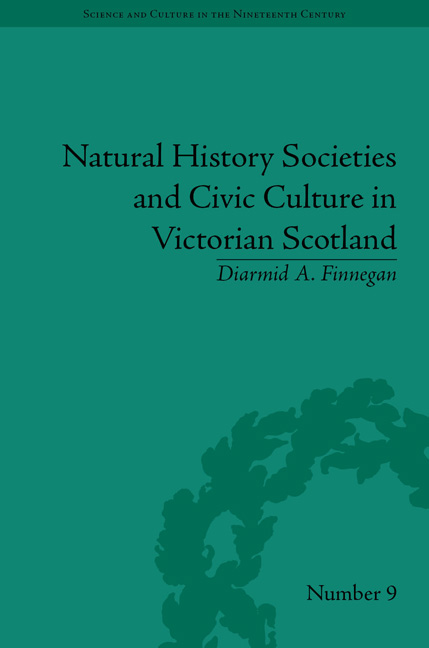Book contents
- Frontmatter
- CONTENTS
- Acknowledgements
- List of Figures and Tables
- Introduction
- 1 Founding Narratives
- 2 Fieldwork and Excursion Culture
- 3 Natural History and Civic Pride
- 4 Natural History and Self Culture
- 5 Organizing Subscriber Science
- 6 Scientific Motives and Civic Virtue
- Conclusion: Between Science and Civic Society
- Notes
- Works Cited
- Index
Introduction
- Frontmatter
- CONTENTS
- Acknowledgements
- List of Figures and Tables
- Introduction
- 1 Founding Narratives
- 2 Fieldwork and Excursion Culture
- 3 Natural History and Civic Pride
- 4 Natural History and Self Culture
- 5 Organizing Subscriber Science
- 6 Scientific Motives and Civic Virtue
- Conclusion: Between Science and Civic Society
- Notes
- Works Cited
- Index
Summary
In 1875 David Page, geologist and enthusiast for intellectual culture, published a pamphlet-length plea for an increase in the number of field clubs and science associations. In his petition Page deployed the well-worn themes that had marked countless calls made in Victorian towns entreating local publics to participate in scientific pursuits. Botany, geology and meteorology among other subjects were recommended to Page's readers as physically and mentally invigorating pastimes. For Page, natural history, more than other forms of intellectual culture, offered a stimulating distraction from the debilitating effects of routine urban existence. Page was careful to point out the dangers of narrow scientific professionalism, a condition incompatible with ‘the duties of brotherly sympathy, honest manliness, and good citizenship, which render life sweet and society enjoyable’. Recreative science, on the other hand, united the pursuit of general happiness and individual intelligence and provided a hopeful way forward amidst signs of social decay.
Page's estimation of the social benefits of a widespread and collective interest in natural science was shared by the Revd Charles Kingsley. In a preface to a series of lectures on ‘town geology’ first published in 1872 Kingsley presented the political advantages associated with diffusing a scientific spirit among Britain's urban classes. The ‘dream’ that Kingsley offered to his readers was of a ‘true working aristocracy’ that functioned according to the habits of mind acquired through active participation in scientific work. The patient study of town geology (or any other branch of natural history) would supply the basis for the freedom, equality and brotherhood, which state government could not by itself provide. As ‘a student of society and history’ Kingsley urged his readers to heed the prognosis – inductively derived – that ‘power will pass more and more, if all goes healthily and well, into the hands of scientific men’.
The testimonies of Page and Kingsley typify a pervasive rhetoric attached to attempts at enlarging participation in scientific pursuits.
- Type
- Chapter
- Information
- Publisher: Pickering & ChattoFirst published in: 2014

